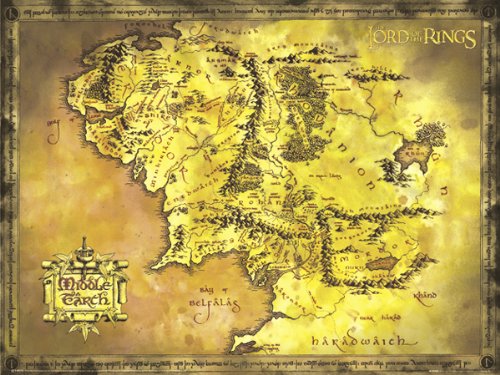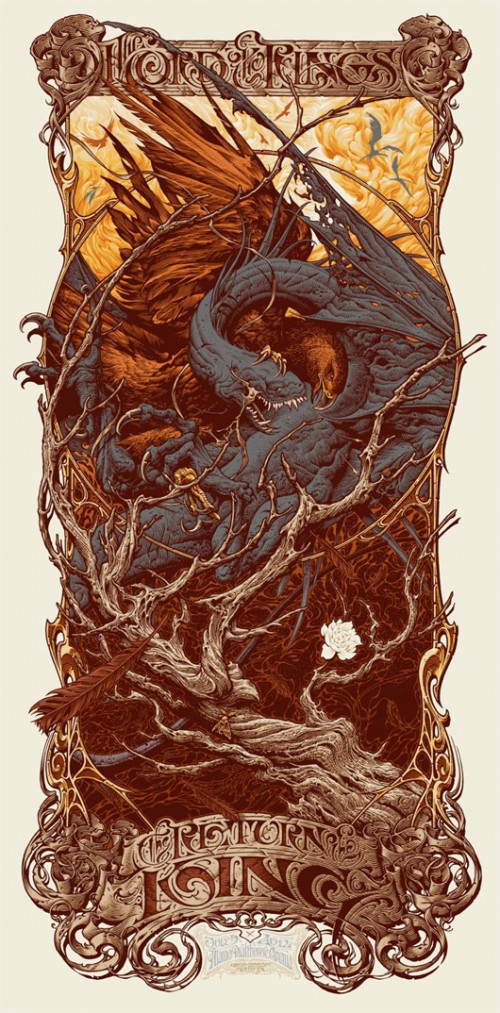 |
| Map of Middle-Earth |
All that is gold does not glitter,
Not all those who wander are lost;
The old that is strong does not wither,
Deep roots are not reached by the frost.
~ J. R. R. Tolkien (wiki) (The Fellowship of the Ring)
The world is indeed full of peril, and in it there are many dark places; but still there is much that is fair, and though in all lands love is now mingled with grief, it grows perhaps the greater.
~ Tolkien (The Fellowship of the Ring)
It is said: "Do not meddle in the affairs of Wizards, for they are subtle and quick to anger."
~ Tolkien (The Fellowship of the Ring)
How do you pick up the threads of an old life? How do you go on, when in your heart, you begin to understand, there is no going back? There are some things that time cannot mend. Some hurts that go too deep ... that have taken hold.
~ Tolkien (The Return of the King)
 |
| Commissioned poster by Aaron Horkey (wiki) for The Lord of The Rings film series. Larger version here. |
It is not our part to master all the tides of the world, but to do what is in us for the succour of those years wherein we are set, uprooting the evil in the fields that we know, so that those who live after may have clean earth to till. What weather they shall have is not ours to rule.
~ Tolkien (The Return of the King)
The Road goes ever on and on
Down from the door where it began.
Now far ahead the Road has gone,
And I must follow if I can,
Pursuing it with eager feet,
Until it joins some larger way
Where many paths and errands meet,
And whither then? I cannot say.
~ Tolkien (walking song, several versions of which appear in The Lord of the Rings)
Faithless is he who says farewell when the road darkens.
~ Tolkien (The Fellowship of the Ring)
No one ever influenced Tolkien - you might as well try to influence a bandersnatch.*
~ C. S. Lewis (1898-1963) (letter, May 1959)
Today is the anniversary of the birth of English philologist and author J(ohn) R(onald) R(eul) Tolkien (wiki) (1892-1973), best known as the author of the cult classic, The Lord of the Rings. Born to English expatriates in Bloemfontein, South Africa, Tolkien studied languages at Oxford and served in the British Army during World War I. After beginning his academic career at the University of Leeds, he became in 1925 the Bosworth professor of Anglo-Saxon at Oxford, where he developed the languages and supporting mythology that led to his epic magnum opus, The Lord of the Rings (published in three parts in 1954-55). Earlier, in 1937, he had written The Hobbit, which established a certain basis for his later work. (Here's a C. S. Lewis review of The Hobbit from 1937)
* N.B. The reference here is to the mythical beast mentioned in Lewis Carroll's nonsense poems, "Jabberwocky" and "The Hunting of the Snark."
The LOTR in 90 seconds:
CGP Grey explains the backstory of Middle-Earth in four minutes:
And the story of the One Ring:
Epic Rap Battles of History: J. R. R. Tolkien vs. George R. R. Martin - who is the king of fantasy novels?:
An orc dance:
An a Lego version of the battle of Helm's Deep:
Related posts and links:
Tiffany meets Tolkien: Lord of the Rings Stained-Glass-Style Art.
Everything you wanted to know about the physics and math of Hobbit strength.
Related Tolkien physics:
Part of the text above is adapted from Ed's Quotation of the Day, only available via email - leave your email address in the comments if you'd like to be added to his list. Ed is the author of Hunters and Killers: Volume 1: Anti-Submarine Warfare from 1776 to 1943 and Hunters and Killers: Volume 2: Anti-Submarine Warfare from 1943.
Lewis was not only referencing Carroll, he was directly paraphrasing a line from "Through the Looking Glass" ("You might as well try to stop a Bandersnatch!").
ReplyDelete